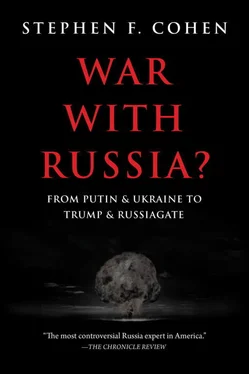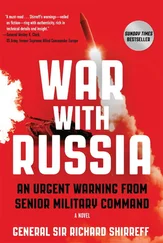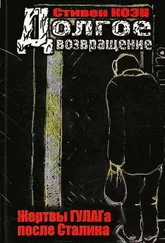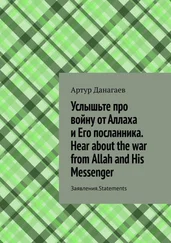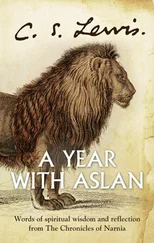Given all that has happened during the past nearly two decades—particularly what Putin and other Russian leaders perceive to have happened—it would be remarkable if his views of the West, especially America, had not changed. As he remarked in 2018, “We all change.” 33A few years earlier, Putin remarkably admitted that initially he had “illusions” about foreign policy, without specifying which. Perhaps he meant this, spoken at the end of 2017: “Our most serious mistake in relations with the West is that we trusted you too much. And your mistake is that you took that trust as weakness and abused it.” 34
If my refutation of the axioms of Putin demonization is valid, where does that leave us? Certainly, not with an apologia for Putin, but with the question, “Who is Putin?” Russians like to say, “let history judge,” but given the perils of the new Cold War, we cannot wait. We can begin at least with a few historical truths. In 2000, a young and little-experienced man became the leader of a vast state that had precipitously disintegrated, or “collapsed,” twice in the twentieth century—in 1917 and again in 1991—with disastrous consequences for its people. And in both instances it had lost its “sovereignty” and thus its security in fundamental ways.
These have been recurring themes in Putin’s words and deeds. They are where to begin an understanding. No one can doubt that he is already the most consequential “statesman” of the twenty-first century, though the word is rarely, if ever, applied to him in the United States. And what does “consequential” mean? Even without the pseudo-minuses spelled out above, a balanced evaluation will include valid ones.
For example, at home, was it necessary to so strengthen and expand the Kremlin’s “vertical” throughout the rest of the country in order to pull Russia back together? Should not the historic experiment with democracy have been given equal priority? Abroad, were there alternatives to annexing Crimea, even given the perceived threats? And did Putin’s leadership really do nothing to reawaken fears in small East European countries victimized for centuries by Russia? These are only a few questions that might yield minuses alongside Putin’s deserved pluses.
Whatever the approach, whoever undertakes a balanced evaluation should do so, to paraphrase Spinoza, not in order to demonize, not to mock, not to hate, but to understand.
Part I
THE NEW COLD WAR ERUPTS 2014–2015
Patriotic Heresy vs. Cold War
August 27, 2014
(Adapted from a talk given in Washington, DC, on June 16, 2014.)
WE MEET TODAY DURING THE WORST and potentially most dangerous American-Russian confrontation in many decades, probably since the 1962 Cuban Missile Crisis. The Ukrainian civil war, precipitated by the unlawful change of government in Kiev in February, is already growing into a proxy US-Russian war. The seemingly unthinkable is becoming imaginable: an actual war between US-led NATO and post-Soviet Russia.
Certainly, we are already in a new Cold War that Western sanctions will only deepen, institutionalize, and prolong—one potentially more dangerous than its 40-year predecessor, which the world barely survived.
We—opponents of the US policies that have contributed so woefully to the current crisis—are few in number, without influential supporters, and unorganized. I am old enough to know our position was very different in the 1970s and 1980s, when we struggled for what was then called détente. We were a minority, but a substantial minority with allies in high places, including in Congress and the State Department. Our views were solicited by mainstream newspapers, television, and radio. In addition to grassroots support, we had our own well-funded lobbying organization in Washington, the American Committee on East-West Accord, whose board included corporate CEOs, political figures, prominent academics, and statesmen of the stature of George Kennan.
We have none of that today. We have no access to the Obama administration, virtually none to Congress, now a bipartisan bastion of Cold War politics, and very little to the mainstream media. We have access to important alternative media, but they are not considered authoritative, or essential, inside the Beltway. In my long lifetime, I do not recall such a failure of American democratic discourse in any comparable time of crisis.
I want to speak generally about this dire situation—almost certainly a fateful turning point in world affairs—as a participant in what little mainstream media debate has been permitted but also as a longtime scholarly historian of Russia and of US-Russian relations and informed observer who believes there is still a way out of this terrible crisis.
Regarding my episodic participation in the very limited mainstream media discussion, I will speak in a more personal way than I usually do. From the outset, I saw my role as twofold.
Recalling the American adage “There are two sides to every story,” I sought to explain Moscow’s view of the Ukrainian crisis, which is almost entirely missing in US mainstream coverage. What, for example, did Putin mean when he said Western policy-makers were “trying to drive us into some kind of corner,” “have lied to us many times” and “have crossed the line” in Ukraine? Second, having argued since the 1990s, in my books and Nation articles, that Washington’s bipartisan Russia policies could lead to a new Cold War and to just such a crisis, I wanted to bring my longstanding analysis to bear on today’s confrontation over Ukraine.
As a result, I have been repeatedly assailed—even in purportedly liberal publications—as Putin’s No. 1 American “apologist,” “useful idiot,” “dupe,” “best friend,” and, perhaps a new low in immature invective, “toady.” I expected to be criticized, as I was during nearly twenty years as a CBS News commentator, but not in such personal and scurrilous ways. (Something has changed in our political culture, perhaps related to the Internet, but I think more generally.)
Until now, I have not replied to any of these defamatory attacks. I do so today because I now think they are directed at many of us in this room and indeed at anyone critical of Washington’s Russia policies, not just me. Re-reading the attacks, I have come to the following conclusions:
None of these character assassins present any factual refutations of anything I have written or said. They indulge instead in ad hominem slurs based on distortions and on the general premise that any American who seeks to understand Moscow’s perspectives is a “Putin apologist” and thus unpatriotic. Such a premise only abets the possibility of war.
Some of these writers, or people who stand behind them, are longtime proponents of the twenty-year US policies that have led to the Ukrainian crisis. By defaming us, they seek to obscure their complicity in the unfolding disaster and their unwillingness to rethink it. Failure to rethink dooms us to the worst outcome.
Equally important, these kinds of neo-McCarthyites are trying to stifle democratic debate by stigmatizing us in ways that make our views unwelcome on mainstream television and radio broadcasts and op-ed pages—and to policy-makers. They are largely succeeding.
Let us be clear. This means that we, not the people on the left and the right who defame us, are the true American democrats and the real patriots of US national security. We do not seek to ostracize or silence the new cold warriors, but to engage them in public debate. And we, not they, understand that current US policy may have catastrophic consequences for international and American security.
Читать дальше
